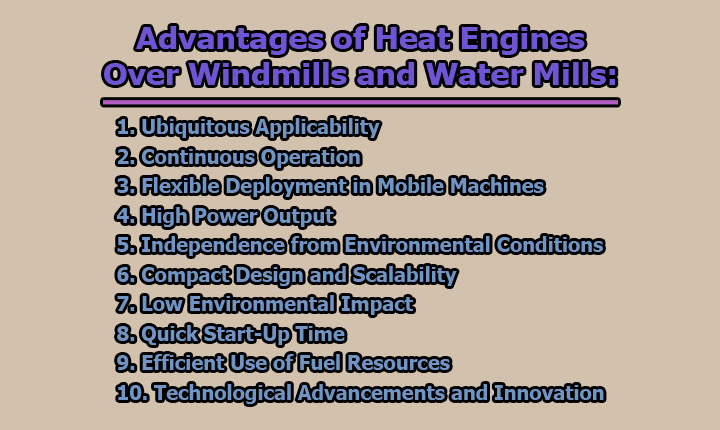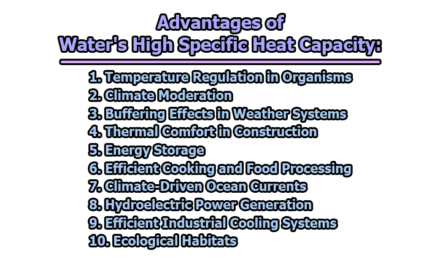Advantages of Heat Engines Over Windmills and Water Mills:
The quest for efficient and versatile sources of energy has been a constant endeavor throughout human history. Among the myriad options available, heat engines stand out for their remarkable advantages over traditional counterparts like windmills and water mills. Here are some of the essential advantages of heat engines over windmills and water mills:
1. Ubiquitous Applicability: One of the foremost advantages of heat engines lies in their universal applicability. Unlike windmills, which are reliant on the sporadic nature of wind, and water mills, dependent on consistent water flow, heat engines can operate virtually anywhere. This adaptability makes heat engines an ideal solution for energy generation in diverse geographical locations, ensuring a reliable energy supply irrespective of environmental conditions. Their versatility addresses a critical limitation of windmills and water mills, making heat engines a compelling choice for a wide range of applications.
2. Continuous Operation: A hallmark feature of heat engines is their ability to operate continuously, setting them apart from their renewable counterparts. Windmills are susceptible to the whims of wind, and water mills face interruptions due to variations in water flow. In contrast, heat engines can function seamlessly at any time of the day, ensuring a constant energy supply. This continuous operation addresses the intermittent nature of renewable energy sources, making heat engines a reliable option for meeting the consistent energy demands of modern society.
3. Flexible Deployment in Mobile Machines: Heat engines exhibit a unique advantage in their capacity to power mobile machines. Unlike windmills and water mills, which are inherently static, heat engines can efficiently propel vehicles such as locomotives, cars, and scooters. This versatility extends the reach of heat engines beyond stationary energy production, contributing to sustainable and efficient mobility solutions. The ability to power transportation systems further emphasizes the adaptability and practicality of heat engines in diverse applications.
4. High Power Output: Perhaps one of the most compelling advantages of heat engines is their superior power output. The efficiency inherent in their design allows heat engines to generate substantial energy, making them capable of handling higher power demands. This characteristic sets them apart from windmills and water mills, which may struggle to match the power output required for applications such as industrial processes, large-scale manufacturing, and transportation. The enhanced power output positions heat engines as a key player in meeting the growing global energy demand.
5. Independence from Environmental Conditions: While windmills and water mills are susceptible to the variability of weather conditions, heat engines operate independently of environmental factors. This independence ensures a consistent energy supply, unaffected by changes in wind speed, water flow, or seasonal variations. Heat engines, therefore, stand out as a reliable and stable source of power, mitigating the challenges associated with the reliance on external factors that can affect the performance of wind and water-based energy systems.
6. Compact Design and Scalability: Heat engines exhibit a compact design that facilitates easy integration into various settings. Unlike windmills and water mills, which may require significant space and infrastructure, heat engines can be adapted to fit the spatial constraints of diverse environments. This scalability extends their applicability, making them suitable for both small-scale applications and large-scale industrial operations. The ability to seamlessly adjust the size and output of heat engines according to specific energy needs enhances their versatility, providing an efficient solution for a wide range of users.
7. Low Environmental Impact: In comparison to traditional energy sources and even some renewable alternatives, heat engines showcase a lower environmental impact. The combustion processes in heat engines can be optimized for efficiency, resulting in reduced emissions and a cleaner energy production method. This aligns with global efforts to mitigate climate change and reduce carbon footprints. The lower environmental impact of heat engines positions them as a more sustainable choice for energy generation, contributing to the transition towards cleaner and greener technologies.
8. Quick Start-Up Time: Heat engines boast a notable advantage in their rapid start-up time. Unlike windmills and water mills that may have variable and sometimes delayed activation periods, heat engines can initiate operation swiftly. This quick start-up time is crucial in scenarios where immediate energy needs arise, enhancing the overall reliability of heat engines. The ability to swiftly respond to changes in demand makes heat engines a practical and efficient solution for dynamic energy requirements in various sectors.
9. Efficient Use of Fuel Resources: Another key advantage of heat engines lies in their ability to optimize the use of fuel resources. The efficiency of the combustion processes within heat engines ensures a higher conversion rate from fuel to energy, minimizing waste and maximizing output. This efficiency not only contributes to cost-effectiveness but also aligns with sustainable practices by reducing resource consumption. The efficient utilization of fuel resources positions heat engines as an environmentally conscious choice in the broader landscape of energy production.
10. Technological Advancements and Innovation: The field of heat engine technology is dynamic and continually evolving. Ongoing research and innovation drive improvements in efficiency, performance, and environmental impact. This commitment to progress ensures that heat engines remain at the forefront of modern energy solutions. As technological advancements continue to enhance their capabilities, heat engines hold the promise of even greater efficiency, reliability, and sustainability, further solidifying their role in shaping the future of energy generation.
In conclusion, the advantages of heat engines over windmills and water mills are multifaceted, ranging from their adaptability and continuous operation to their applicability in mobile machines and superior power output. As the world seeks sustainable and efficient energy solutions, heat engines emerge as a promising option that transcends the limitations of traditional renewable sources. The continuous advancements in heat engine technology further underscore their potential to revolutionize the energy landscape, offering a reliable, versatile, and powerful alternative for meeting the growing global energy demand.

Former Student at Rajshahi University










